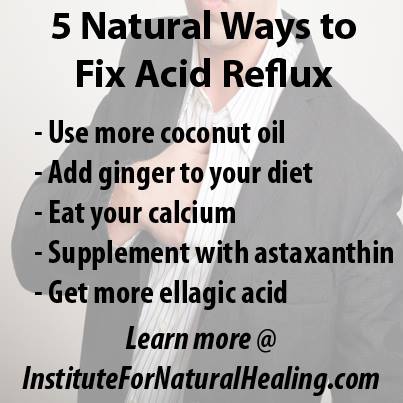There’s something you should know…
Having too much stomach acid isn’t what causes acid reflux. One of the major causes is the lower esophageal sphincter (LES) not closing properly after a meal. If that happens, the stomach acids can make their way back up into your esophagus.1
Don’t waste your time with prescription medications or over-the-counter antacids. They make heartburn, acid reflux and gastroesophageal reflux disease (GERD) worse over the long run. And the longer you wait for them to work, the more pain you’ll be in. But you can start feeling relief today.
Here are 5 proven, natural solutions for fighting acid reflux:
1. Coconut Oil: It’s one of the best fats you can eat to support your health. But a tablespoon of coconut oil each day is also a great way to prevent acid reflux from acting up.
Coconut oil is antimicrobial. Eating it cleans the bacteria out of your esophagus. It heals the damage caused by acid reflux. It also kills the harmful bacteria in your gut that cause inflammation.
This fat will also help your body produce chloride. You need this for your body to make stomach acid. Not having enough stomach acid can actually cause acid reflux. Without enough of it, you won’t be able to fight off bacteria…or properly digest the foods you eat.2
2. Ginger: The power of ginger goes way beyond fixing a bellyache.
Ginger is up to eight times more effective at killing bacteria that can cause acid reflux than drugs like Prevacid.3 Ginger doesn’t stop your body from making stomach acid. It simply helps keep it under control.
And because of its antioxidant and antimicrobial properties, ginger can make the lining of your stomach stronger.4 As a result, you won’t feel the effects of acid reflux as much even when it acts up on you.
You can use whole ginger to add new flavors to meals, but you can also find it as a supplement. It makes a great addition to tea as well.
3. Calcium: Not getting enough calcium leads to much more than weak bones.
Calcium makes the LES tighten. This helps keep stomach acid where it belongs. But we don’t recommend taking a supplement. It needs to come from whole food sources and get absorbed in the stomach to be effective.5
Try adding some to your diet to keep your LES working the right way. But don’t depend on milk. You can do better than that. Sardines, salmon, kale, and plain yogurt are great sources of calcium… And they aren’t as inflammatory.
4. Astaxanthin: One study shows that subjects who received 40 mg of this a day had significant improvements in their acid reflux symptoms after four weeks. And the healing effect was more pronounced in people with Helicobacter pylori (H. pylori) infections.6 This harmful bacterium causes ulcers and an imbalance of stomach acid. In other words, you don’t want it hanging around.
You can get astaxanthin from cold water fish like wild-caught salmon. But there’s also a good amount of it in most krill oil supplements as well.
5. Ellagic Acid: This polyphenol protects your stomach and esophagus from H. pylori. It also fights inflammation and protects you against ulcers.7
Studies show that it decreases tumor growth caused by H. pylori by up to 55 percent.8
Even if ulcers aren’t something you worry about, it reduces the inflammation that helps cause acid reflux symptoms. You can find it in strawberries, pomegranates, and walnuts.
If you struggle with acid reflux, GERD, or even the occasional heartburn, antacids definitely aren’t the answer. You want to actually fix the problem causing the symptoms, not just get temporary relief.
Instead of a prescription or over-the-counter “remedies,” try any of these natural solutions to treat your acid reflux and help keep it from coming back for good.
Because in our survey of the top 10 most dangerous prescription drugs on the market today, one acid-reflux medication made the list. It decreases the amount of acid your stomach produces…but the FDA has already issued two warnings about it. People who take it are at higher risk for hip fracture, and more.
You may already take this or one of the other top 10 most dangerous drugs. See how to uncover them and their natural alternatives, here.
Like this Article? Forward this article here or Share on Facebook.
References:
1 http://articles.mercola.com/sites/articles/archive/2009/04/25/News-Flash-Acid-Reflux-Caused-by-Too-Little-Acid-Not-Too-Much.aspx
2 http://www.westonaprice.org/digestive-disorders/acid-reflux-a-red-flag
3 http://www.ncbi.nlm.nih.gov/pubmed/17295419
4 http://www.greenmedinfo.com/blog/can-ginger-beat-out-multi-billion-dollar-acid-blockers#_edn1
5 http://www.huffingtonpost.com/leo-galland-md/acid-reflux-the-truth-beh_b_541649.html
6 http://www.ncbi.nlm.nih.gov/pubmed/18467083
7 http://www.lef.org/magazine/mag2013/nov2013_Block-Acid-Reflux-to-Prevent-Esophageal-Problems_02.htm
8 http://carcin.oxfordjournals.org/content/11/1/55


